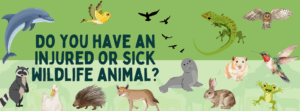
What to Do If You Find an Injured Wild Animal
If you come across a sick, injured, or vulnerable wild animal—such as a raccoon, rabbit, seal, or bird—in Coronado, California, please call the Coronado Police Department’s non-emergency line at (619) 522-7350 for guidance.
If you are outside of Coronado, please call Project Wildlife at (619) 299-7012 for expert help.
***Never handle wildlife without speaking to an expert at Project Wildlife first. Wildlife can be very dangerous & unpredictable.***
Important: Do Not Feed the Animal
While it may feel like the right thing to do, feeding wild animals can cause serious harm and interfere with their natural recovery or rescue efforts. Instead, follow these basic care steps until help arrives or you can transport the animal safely:
Basic Steps for Assisting an Injured Wild Animal to take to Project Wildlife
- Use gloves, a towel, or cloth to gently pick up the animal.
- Place the animal in a secure container or box with air holes and a soft towel lining the bottom.
- Keep the box in a quiet, safe place, away from children and pets.
- Minimize noise, light, and contact. You can loosely cover the container with a towel to reduce stress.
- Do not attempt to feed or give water.
- If possible, provide gentle warmth by placing a heating pad (on low) under half the container.
Animals You Should Not Attempt to Handle Yourself
Some wild animals require specialized care and can pose a risk to your safety or public health. If you encounter any of the following species, please do not attempt a rescue on your own. Instead, follow the guidance below:
Seals, Dolphins, & Marine Life
Marine mammals are protected by federal law under the Marine Mammal Protection Act, and only trained responders are authorized to approach them. If you see a seal or sea lion on the beach, do not get close—what may seem like distress could be natural behavior such as resting.
For dolphins, whales, or any marine animal that appears stranded or in distress:
-
Keep your distance—do not push them back into the water or pour water on them.
-
Prevent others (including pets) from getting near.
-
Call SeaWorld San Diego’s Rescue Team at (800) 541-SEAL or NOAA’s Marine Mammal Stranding Network at (866) 767-6114.
Your quick action and respect for space can help ensure these animals receive the expert help they need.
Coyotes & Bobcats
These are wild predators and should only be handled by professionals. If you find a coyote or bobcat that appears injured, sick, or orphaned, contact the appropriate authorities or Project Wildlife, which provides care for these animals through their Ramona Wildlife Center.
Deer & Fawns
Mother deer often leave their young hidden in grass or brush while they graze—this is normal behavior. If you find a fawn alone, do not assume it’s abandoned. Wait and observe from a distance for 3 to 4 hours before taking any action.
If the fawn is visibly injured or truly orphaned, call:
- San Diego Fawn Rescue at (858) 549-4149 or (858) 603-0170
- California Fish & Wildlife at (760) 535-5735
Stay nearby to monitor the fawn until help arrives.
Raccoons
These animals may carry roundworms, or distemper, all of which can be dangerous to humans and pets. Do not touch or try to contain a raccoon. Instead, call Project Wildlife and keep an eye on the animal from a safe distance until a professional arrives.
Opossums
Although opossums are generally not aggressive, they are still wild animals and can bite or scratch if frightened. If you find an opossum that appears injured, sick, or orphaned, do not attempt to handle it yourself. Instead, contact Project Wildlife for assistance.
Important: Female opossums often carry their babies in a pouch or clinging to their backs. If you see an adult opossum that appears to be injured, check from a safe distance for signs of babies. Never try to separate them or remove the babies yourself. A wildlife professional will assess and care for the whole family safely.
Note: Opossums are known to “play dead” when scared—this is a natural defense behavior. Wait and observe for a few minutes before assuming they need help. If they remain unresponsive or appear truly injured, call for guidance.
Skunks
Skunks are considered high-risk carriers of rabies in California. Never attempt to pick up or contain a skunk yourself. If someone is bitten, they must contact their doctor and the public health department within 24 hours.
Signs of illness—such as stumbling, eye or nose discharge, or strange behavior—can indicate serious diseases like rabies or distemper. Contact Project Wildlife immediately for guidance on how to proceed.
Mountain Lions & Black Bears
These large predators should never be approached, even if they appear to be hurt or abandoned. Contact the California Department of Fish & Wildlife at (858) 467-4201. If rehabilitation is necessary, their team will coordinate with the Ramona Wildlife Center to ensure the animal is transported safely for care.

